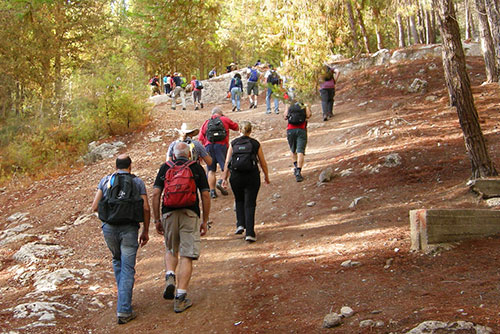27 Apr We Can’t Exist Without Nature

As wealthy, developed, and technologically advanced as we are, ultimately, nature is the bedrock of our human existence, and the key to human resilience, health, stability, and wellbeing. By harming nature, we harm ourselves even more.
It is with mixed emotions and a conflicted heart that I am following the photos, videos, and news reports about how nature is flourishing right now, as human activity in public spaces has been almost entirely prohibited.
How heartwarming and wonderful it is, particularly for a nature lover like me, to see wild animals roaming unhindered in places where they are not usually to be found. However, headlines like “People in captivity, wild animals enjoy themselves” bothers me because of the message they convey. Such headlines suggest a false perception of “it’s them [nature] or us,” that the wellbeing of nature is at odds with, or comes at the expense of, the wellbeing of humanity and human welfare; that nature can thrive only when we humans are severely restricted in our activities, and when we are suffering.
For the same reason, I am concerned about the correlation that could be made between the improvements in environmental quality that are currently being reported, and the dramatic reductions in human activity. Here, too, the context creates a dichotomy whereby quality of life and of the environment—air quality, water quality, nature preservation—are the results of a downturn, an economic crisis, and a disruption to the routine of human activity. As with any crisis or upheaval, the Coronavirus crisis challenges the basic assumptions that we live by in various areas of human endeavor. One of the defining characteristics of an epidemic is cultural change. However, we do not yet know whether or how human culture will shift as a result of this current crisis, whose conclusion is, at this point, still uncertain.
One of the main areas in which dramatic cultural change is needed is of our relationship with nature.
There is no doubt that one of the main areas in which dramatic cultural change is needed is of our relationship with nature. As far as we know, the Coronavirus, like other epidemics that preceded it, is a zoonotic disease originating in a mutated virus transmitted from animals to humans as a result of hunting and eating wild animals. The creation and spread of zoonotic diseases stem from the hunting, trafficking, and consumption of wildlife, the destruction of habitats, and largescale intensive farming of animals for the meat and dairy industry, which is an agent for disease transmission (as in the case of swine flu, for example). Moreover, the infrastructure created by globalization has allowed this disease to spread at inconceivable speed, from a single individual in China to millions of people across the globe.
Even before the Coronavirus crisis, the overexploitation of natural systems—the topic of a 2019 report by the United Nations—had deteriorated these systems so severely that our very ability to continue living on this planet was under threat. The report, written by 145 experts from 50 countries over the course of three years, found that the natural systems are in a worse state than we previously thought; if we do not take immediate action, more than 500,000 species will lack the sufficient living space to ensure their long-term survival.
Healthy, stable, and functioning natural systems are not a luxury.
Healthy, stable, and functioning natural systems are not a luxury. Nature is not a luxury. Natural systems are the bedrock of our existence in every single area of our lives: food security, our medicine cabinet, the genetic diversity that guarantees agricultural resilience. They ensure drug development resources, clean air, a balanced climate system, clean water, and, of course, serenity, inspiration, and peace.
Nature is our main ally in reducing the carbon emissions that drive the climate crisis, and in limiting its dangerous consequences. The more severely we harm nature, the more we exacerbate the climate crisis and weaken our ability to deal with it.
And so at this moment, we are under lockdown and wildlife is rejoicing—but this is not how it should be. We all share the same planet, and while nature can exist without us, we cannot exist without nature. As wealthy, developed, and technologically advanced as we may be, ultimately, nature is the bedrock of our human existence and the key to human resilience, health, stability, and well-being. When we harm nature, we cause ourselves even greater harm.
We need a new normal, one that is characterized by a strong, healthy relationship with nature.
I think that all of us are awaiting a return to normalcy. But we need a new normal, one that is characterized by a strong, healthy relationship with nature. This must be based on an understanding of our dependence on nature, a sense of respect and humility in the face of this treasure we have been charged with protecting, and the recognition that we will pay a heavy price for the abuse and overexploitation of that treasure. But this does not mean giving up on comfort, economic prosperity, or wealth. Quite the opposite is true. Healthy natural systems and environmental quality are signs of healthy growth and of a stable, sustainable economy, one that recognizes the boundaries of natural capital—natural resources—and does not selfishly exploit these, depleting the bank for future generations and bringing them to the brink of existential bankruptcy.



